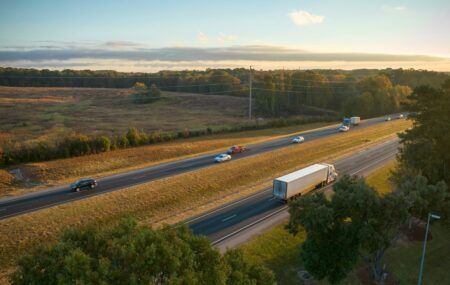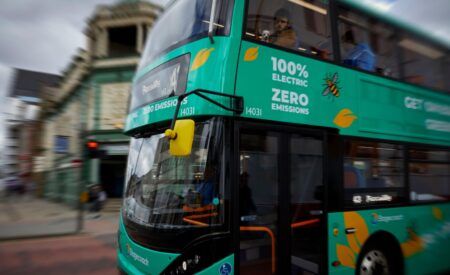Sustainable transport campaigners are calling for the way that heavy goods vehicles (HGVs) are charged to use UK roads to change, to better reflect the impact that trucks have on the environment and other road users.
Submitting evidence to the Department for Transport (DfT) consultation on reforming the HGV Road User Levy, Campaign for Better Transport is calling for the existing time-based charging system to be replaced with a distance-based one.
The current road user levy was introduced in 2014 to ensure foreign HGV operators paid an appropriate charge for using the road network. However, there is widespread acknowledgement that the current levy, paid by both UK and foreign operators, does not go far enough, and that the real impact of trucks on other road users and the road network is not properly accounted for.
The transport charity believes that reforming the levy to a distance-based system would be the single most effective way to achieve the government’s stated objectives of improving efficiency, reducing collisions, and lowering air and carbon dioxide pollution levels.
Campaign for Better Transport believes a distance-based truck levy would:
• Improve HGV efficiency, thereby reducing truck miles and congestion, which, according to Inrix, cost the UK £30bn (US$42m) in 2016;
• Vary charges according to the emissions level of the vehicle, encouraging an early takeup of cleaner technology, and help improve air quality, with trucks contributing 17% of road transport carbon dioxide emissions, despite making up only 5% of vehicles;
• Allow rail freight to compete more effectively on price, which would have environmental benefits, as well as helping reduce traffic congestion and crashes.
“We support the government’s aim to reduce road congestion and pollution by incentivizing more efficient use of the road network through an effective lorry road charging system,” noted Philippa Edmunds, from Campaign from Better Transport.
“The existing time-based system has neither led to efficiencies – empty running is now at 30%, the highest level for years – nor a reduction in emissions and collisions in the UK. The overwhelming evidence shows distance-based HGV charging systems can reduce lorry miles, and therefore reduce congestion, pollution and crashes.
“Furthermore, a distance-based system would make it fairer for rail freight to compete if HGVs were paying a fairer proportion of the costs they impose on the economy and society.”




